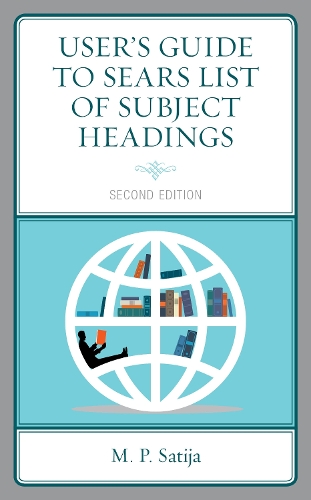
Users Guide to Sears List of Subject Headings
(Paperback, Second Edition)
Publishing Details
Users Guide to Sears List of Subject Headings
By (Author) M. P. Satija
Bloomsbury Publishing PLC
Rowman & Littlefield Publishers
31st October 2019
Second Edition
United States
Classifications
Professional and Scholarly
Non Fiction
025.49
Physical Properties
Paperback
234
Width 154mm, Height 217mm, Spine 17mm
354g
Description
The Sears List of Subject Headings, an outstanding name amongst subject headings lists, is used all over the world in small and medium sized libraries. It has constantly been revised and kept up to date, both in its methods and contents, by incorporating new subjects and updated organizational machinery. Being handy, simple, inexpensive and always current, the Sears List is a convenient choice for teaching subject headings work in library schools.
Users Guide to Sears List of Subject Headings, 2nd Edition is a companion book which, although based on the 222nd edition of the Sears List, should also be useful to the libraries using some previous edition. It attempts to explain the theoretical foundations, history and application of the Sears List as well as of the subject headings work ion general. It explicates the various hidden potentials of the system to construct subject headings needed for local situations. The object of this small, practical introduction is to be simple, clear and illustrative.
The book assumes no prior knowledge either of the Sears List or of subject headings work in general. It is a manual for beginners to understand the importance of vocabulary control, the process of subject analysis, the structure and organization of the Sears List, and the methods to locate, specify and construct subject headings and provide cross references for the public catalogue. Subject headings in the complex areas of languages, literatures, biographical and geographical works are given a chapter each. Review questions and exercises conclude most chapters. A bibliography and glossary are valuable features of this work
Reviews
Sears List of Subject Headings has become an important resource for small public and K-12 school libraries and heralded for its simplicity and attempts to promote the use of more natural language-based versions of the Library of Congress Subject Headings. Overall, the second edition of Users Guide to Sears List of Subject Headings is an excellent textbook and guide to use when learning about and working with Sears List. I highly recommend considering it for purchase especially if you are involved in subject analysis training and instruction. * Technicalities *
Users Guide to Sears List of Subject Headings is a manual to the significantly updated 22nd edition of Sears. This practical handbook for catalogers is packed with examples and step-by-step instructions for applying the procedures and methods of Sears in any classification or content form. New chapters have been added to instruct readers to effectively use the Sears online database platform and to apply current MARC coding in subject fields. Providing clear-cut explanations about the changes found in the 22nd edition, Users Guide to Sears List of Subject Headings is an important companion tool that supports catalogers with practical procedures and examples in the dynamics of subject access cataloging. -- Marie Keen Shaw, program coordinator, Library Technology Certificate, Three Rivers Community College, Norwich, CT
Comprehensive in scope and thorough in coverage this expert guide offers historic information, theoretical explanations and practical advice for the understanding and use of the 22nd edition of the Sears List of Subject Headings. Indispensable for any librarian working in a Sears-based environment. -- Marie Kelsey, Ph.D., Library Science, University of Wisconsin, Madison
Author Bio
M.P. Satija
Professor Satija retired as Professor and Head from the Department of Library and Information Science, Guru Nanak Dev University, Amritsar, India and later as the UGC Emeritus Fellow. He is the author of DDC: A Practical Guide, 2nd, ed., published by OCLC and A Dictionary of Knowledge Organization, published in India, as well as some other twenty books and over 150 articles in peer-reviewed journals from India and abroad. Dr. Satija is a member editorial advisory board of the ISKO journal Knowledge Organization, as well as of the UDC Consortium, the Hague. He has served as visiting professor in many Indian and foreign universities in India, the Netherlands, South Korea, and Sri Lanka.
